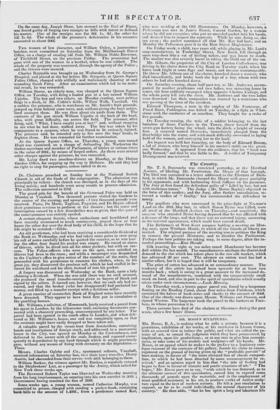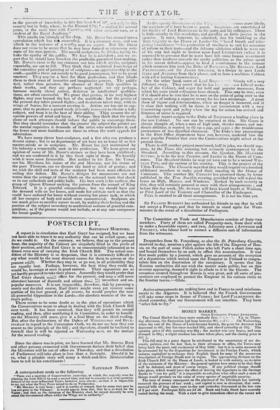MR. ROSSI'S SCULPTURE:3.
Ma. Rossi, RA., is making what he calls a private, because it is a gratuitous, exhibition of his works, at his residence in Lisson Grove, with an avowed view to induce the public, and what are called the pa- trons of art, to amend the, judgment which they have pronounced, by implication, upon his productions ; or at any rate to give him commis- sions, or take some of his models and sculptures off his hands. Mr. Rossi, in an appeal which he makes in the preface to a laudatory cata- logue raisonn6 of the contents of his gallery, founds his claim to encou- ragement on the ground of having given up the "profitable pursuit" of bust-making, in favour of "the more elevated line of classic composi- tion, to which he had been directed by some encouragement he re- ceived," and an opinion urged to him that "the tide of feeling had begun to flow in favour of historiC and poetic creations of art." "The hopes," Mr. Rossi goes on to say, "with which be was-flattered, as to the ultimate success of this speculation, caused him to expend some thousands of pounds upon the materials, and in the employment of most qualified assistants in his art, to produce works of native sculp- ture equal to the best of modern nations. lie felt a just emulation to support, so far as he could individually, the mental character of his country." He then adds, "that be has spent a long and laborious life
in the pursuit of knowledge in this fine hrenA of ar'„ not only in this country but in Italy, where, in the Eternal City, studied for several years, at the same time with CANOVA, and 'ether emineet men, as a student of the Royal Academy. This smells too strongly of the shop.. Mr. Rossi has entered into a speculation which has not succeeded. It is a common case, and one which in the instance of a worthy man we regret. But Mr. Itossi does not seem to be aware that he may have formed an erroneous esti- mate of his own powers. his unsold sculptures, he thinks, tacitly re- brike the apathy of the public. We fear he is mistaken ; and we re- gret that he should have forsaken the profitable pursuit of bust-making. Mr. Rossi's error is the too common one into which artists, sculptors especially, are apt to fall. They think that a technical knowledge of the executive part of painting or of sculpture—an apprenticeship to the craft—qualifies them not merely to be good journeymen, but to be great masters. They acquire a love for their profession, and that blinds them to their want of inventive and imaginative powers. The public feel, rather than perceive, the absence of these high qualities in their works, and they are perhaps neglected : we say perhaps, because merely clever artists, deficient in intellectual qualifica- tions, are often successful. We grant that genius, in its very highest flights, may soar beyond the ken of the mult?tude : but the genius of the present day takes ground flights ; and dexterous talent may, with its wings of Icarus, for a moment overtop it. Artists are too apt to sup- pose, that to produce a grand work, it is only necessary to choose a lofty subject, and treat it to the best of their ability. They assume the re- quisite powers of mind and fancy. Perhaps they think that the rarity alone of such attempts should induce the public to encourage them. But they should remember that the greater the subject the greater are the mental requisites it demands of the artist who undertakes it, and the fewer and more fastidious are those to whom the work appeals for admiration.
We have many clever bust-sculptors, and a few who can produce a decent statue; but in no department of art have we to boast of so &w master-minds as in sculpture. Mr. Rossi has just maintained by his industry a respectable rank in his profession. We have given our opinion of some of Mr. Rosst's statues as they have been exhibited ; and we are confirmed in it by this fresh sight of them. We heartily wish it were more favourable. But neither in his Eve, his Venus, -nor his Musidora, his statue of the god Mercury, nor his statue of the poet Thomson, can we discern the hand or mind of genius ; and we wish the skill and taste of the sculptor had been more efficient- in veiling this defect. Mr. Rossi's designs for monuments are not worse than the average of those libels on the national taste that shock us in our cathedrals and public halls. His best work is his earliest, the group of Queen Eleanor sucking the poison from the wound of King Edward. It is a graceful composition ; but we should have put the devoted wife on her knees, and made her attitude such as that she could have endured for hours without ceasing her pious task, in which
all her energies of body and mind were concentrated. Sculptors are too much given to sacrifice nature to art, by making their feeble, and the passion of the subject secondary to academical notions of graceful com-
position; as if the greater would not include, or at any rate overpower the lesser quality.



















 Previous page
Previous page